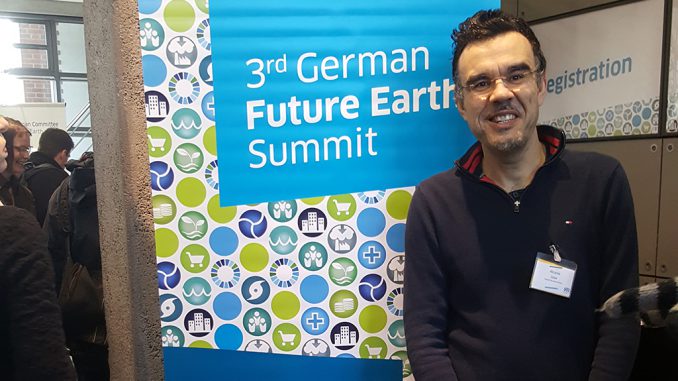
On the 8th and 9th of February, the German Chapter of the most prestigious network of networks around sustainability – Future Earth – gathered in Berlin for the 3rd German Future Earth Summit to share cutting-edge knowledge on the most recent trends around sustainable consumption and production, and other issues regarding global sustainability.
There, MBS Professor Dr. Jose Alcaraz actively participated in the related workshop organized by members of the Potsdam Institute for Climate Impact Research (PIK), with whom Dr. Alcaraz is also collaborating. The inter-disciplinary workshop had participants from universities and other institutions such as the Federal Institute for Risk Assessment (BfR), the Gesellschaft für Internationale Zusammenarbeit (GIZ), the Federal Ministry for Economic Cooperation and Development (BMZ), the Federal Ministry of Food and Agriculture (BMEL), diverse SMEs, and MNCs such as Ferrero.
Prof. Dr. Alcaraz brought reflections and elicited further discussion around the role of digital transformation for sustainability: what is the role of 3D Printing, BlockChain, Internet of Things and Big Data etc. for new and much needed forms of sustainable consumption and production? Concretely, he encouraged participants to reflect on the following:
- 3D Printing may help in shortening the supply chains as now producers may print “at home” instead of having to ship parts from remote areas
- Blockchain, as it registers all detailed transactions in a distributed “global database”, could help in fostering traceability and transparency (e.g., from the farm to the shelf), or even new peer to peer payment methods (e.g., BitCoin for areas in which cash or banks are “problematic”) as smartphones are the key tool for cryptocurrencies
- IoT: as millions of devices are going to have sensors and produce data, this may help in understanding all processes along the value chains and make them more efficient
- Big Data: availability of big volumes of (structured and unstructured) data may help in understanding key sustainability issues and environmental footprints – e.g., where is most water lost?, what are the lifestyles with more environmental demands?, what are the most efficient ways to organize transportation?



